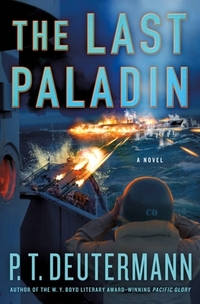Yesterday's Spy by Tom Bradby
 Monday, August 1, 2022 at 6:42AM
Monday, August 1, 2022 at 6:42AM 
Published by Atlantic Monthly Press on August 2, 2022
Yesterday’s Spy is set against the background of the 1953 coup in Iran that displaced Mossadegh and elevated the Shah to power. The coup was planned and assisted by the American and British governments. The British wanted to assure that British oil companies would continue to earn the lion’s share of revenues from Iranian oil. The CIA supported the coup because of its obsession with communism. Neither government considered the long-term consequences of backing the Shah. Western meddling is largely responsible for the Islamic Revolution of 1979.
Harry Tower is a British spy. Lacking a British public school pedigree, he knew he would always be regarded as an outsider by the SIS. Fortunately for Harry, Churchill noticed him and had his back. During World War II, Churchill decided to support Tito. With Churchill’s support, Harry and another SIS agent ran anti-communist operations in Yugoslavia, where Harry got to know KGB agent Oleg Vasilyev. One SIS operation involved British troops parachuting into the country. The operation went sideways because Russia learned of the plan before it began. The deaths of the paratroopers sit heavily on Tower’s conscience.
Harry’s son Sean is a journalist. Sean blames Harry for his mother’s suicide. Harry’s wife suffered from bouts of severe depression and, rather than being there when she cycled into a dark phase, Harry was off saving the world. Harry returned from an assignment and found Sean holding his mother’s body after cutting her from the rope she used to hang herself. Harry understandably blames himself but wishes he could do more for Sean, who wants nothing that Harry tries to give him.
Much of that background is developed through flashbacks. The novel begins in the planning stages of the coup. Harry learns that Sean has been kidnapped. He immediately heads to Tehran, where he meets Sean’s girlfriend, Shahnaz Salemi. Harry has had dealings with Shahnaz’s father. Shahnaz bonded with Sean in part because she and Sean both despised their fathers. Father-child relationships are at the heart of the novel.
The plot is typical of a decent spy thriller. Harry spends the novel chasing down leads (most of which suggest that Sean is dead or will be soon) and figuring out why Sean was kidnapped. Was it his reporting about the drug connection between the Iranian police and the French? Did he learn about the planned coup? Or was the kidnapping part of a plan to lure Harry back to Iran, a plan that involves a suspected mole in SIS? Harry connects with various spies (including Vasilyev), cops, criminals, members of the military, arms dealers, information brokers, and various players in Iranian government, gathering conflicting information as a noose seems to be tightening around Harry’s neck.
Yesterday’s Spy delivers the suspense that readers expect from a spy novel. The clock keeps ticking, both because there may be little time to save Sean if he still alive and because the fate of the Iranian government may change at any moment. Harry is involved in fistfights and shootouts, but his actions seem plausible. Harry is well trained but far from the super-heroic tough guy that is such a common thriller protagonist. It isn’t easy to warm up to Harry, in part because the background that shapes his characterization has made Harry insular and self-absorbed. Still, Tom Brady structured the novel to make it possible for the reader to appreciate the story without liking the protagonist.
As is typical of spy novels that incorporate a mole, the reader is asked to guess the mole’s identity. I guessed wrong, so Bradby scored a point for his surprising reveal. The ending is not only surprising, it is redemptive and satisfying.
RECOMMENDED



